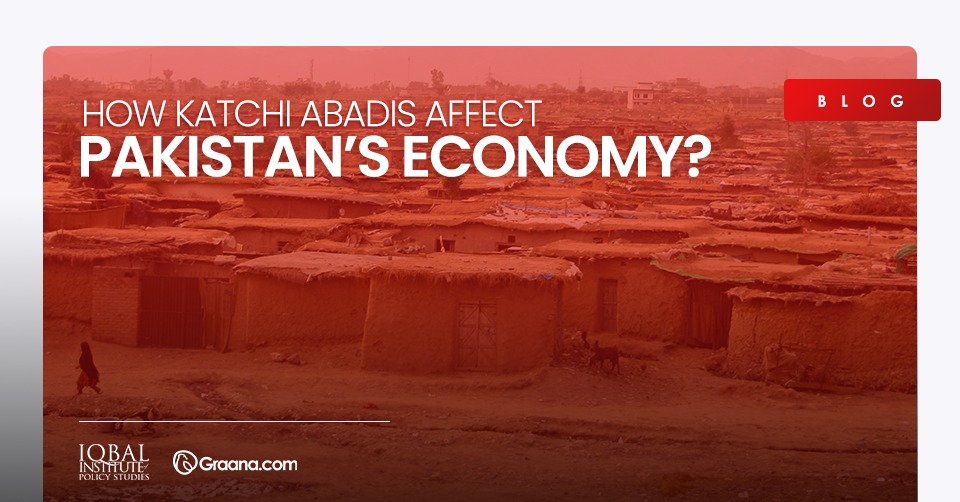
As poverty prevails in Pakistan along with rapid urbanisation, the slum population is increasing.
According to World Bank, 56% (2020) of Pakistan’s urban population lives in slum areas, known as ‘Katchi Abadis‘.
Katchi Abadis refers not only to illegally built mud houses or temporary roofs with no proper roads but also to unregularised communities that lack necessities such as water, electricity, sewerage systems and a solid roof over their heads.
Due to a lack of amenities, Katchi Abadis must fulfil their needs by illegally tapping electricity wires or other connections.
Even though these societies come off as permanent or developed, they are unplanned areas inhabited by people facing high poverty. With time, these slum areas have become partially or fully legalised within urban cities.
However, Katchi Abadis are not positively contributing to the urban development of the major cities as they are unplanned, and the living conditions remain poor despite regularisation.
Graana.com in collaboration with the Iqbal Institute of Policy Studies explores how Kachi Abaadis impact the economy and how they can be utilised for the betterment of the inhabitants and urban cities.
To an unaware eye, Katchi Abadis are regular and legal communities. Still, the development authorities and the government know the reality of these areas and how they impact the development of major cities.
Urban slums are usually located in the middle of big cities. As the world is moving towards modern and aesthetic development projects, the urban slums visually affect the major cities.
Moreover, they utilise a lot of horizontal space that can be used in a much more optimised way. With growing real estate development, land is becoming scarce and expensive daily.
Hence, it is important to realise how to use the space efficiently. Since there is no urban planning of the Katchi Abadis, further development cannot be done as thousands of people live in these communities, and they must also be given full rights to a good living area.
However, if there is no development, it leads to less growth in the economy.
Apart from the effects on society, the urban slum population also faces many issues. These Abadis do not have proper sewerage systems, have poor water disposal management, unavailability of clean water supply, health issues such as airborne diseases, lack of medical facilities, lack of awareness and high illiteracy rate.
Due to such circumstances of the people, there is low earning potential, and they cannot contribute much to the economy. With no stable income and lack of education, slums cannot afford to move to proper houses.
In addition, they are also not granted loans as they are not stable enough to return them. It limits their opportunities and negatively impacts the growth of Pakistan because the majority of the population lives in urban slums.
Addressing the slums is important for promoting economic growth and development. Urban planning is the first step that must be taken by the development authorities or the government to tackle all the challenges of Katchi Abadis.
The utility of land can be maximised so that it can improve the living conditions of the slums and also add to the development of the country. Rather than using most of the horizontal space, vertical structures must be constructed, and the population can be relocated into them.
As they move to permanent and legal houses with basic amenities, their living conditions will automatically improve. The rest of the horizontal space can be used for mega projects that generate revenue and add to the country’s GDP.
The government must do a cost-benefit analysis and invest in the slum population. Society and the economy will benefit as a whole. Gradual modification and effective policies are the way forward to address the issue of slums.
Moreover, it will result in improved productivity, health and education outcomes and a stronger community that will eventually lead to a prosperous economy.
A positive outcome can be achieved by prioritising the ‘Katchi Abadis‘ issue. The economy and development sector will flourish by relocating the population into vertical structures and using the space for other development projects.
The people will also live in legal communities and have rights rather than temporary houses without amenities.
Moreover, it will also reduce illegal activities like tapping electricity wires and water connections.
The planned cities are known to be more livable and happy and visually improve Pakistan’s major cities.
Islamabad / Northern Pakistan: A 5.6 magnitude earthquake struck parts of northern Pakistan on Friday,…
Islamabad: National Highway Authority (NHA) Chairman Muhammad Sheheryar Sultan has announced that the authority has…
Lahore: In a landmark development, the Punjab Environment Department has issued its first-ever comprehensive environmental…
Islamabad, Oct 13: The Islamabad district administration has clarified that all roads in the federal…
Islamabad: Capital Development Authority (CDA) and the Overseas Pakistanis Foundation (OPF) have agreed to collaborate on…
Rawalpindi: The Rawalpindi Municipal Corporation (RMC) has finalized a phased plan to complete multiple ongoing…